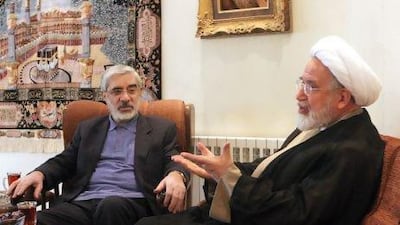Two of Iran's main opposition leaders are in their 70s and in poor health but 23 months of house arrest have failed to crush their "unshakeable spirit", their families said this week.
Mir Hossein Mousavi and Mehdi Karrubi are standing by their "righteous and principled position", they added in a statement that demanded their immediate release. That position is primarily a call for the "ruling apparatus" to recognise "the people's right to self-determination".
Cut off from the outside world, the two men - along with Mr Mousavi's charismatic wife, Zahra Rahnavard - have been denied free access to newspapers, television, the internet and regular family visits.
But all three are now back in the Iranian spotlight ahead of polls in June to elect a successor to President Mahmoud Ahmadinejad.
Reformist groups are torn between participating in next June's presidential election or boycotting it unless Mr Mousavi and Mr Karrubi are freed. Conversely, the regime may only allow reformist candidates to run if they distance themselves from the two men.
Both - who have never been charged, prosecuted or sentenced - ran against Mr Ahmadinejad in the June 2009 presidential elections and insisted his victory was rigged.
With Iran then convulsed by its biggest street protests since the 1979 revolution, leading hardliners accused Mr Mousavi and Mr Karrubi - who became figureheads for the opposition Green movement - of "sedition". They were accused of serving the interests of Iran's western adversaries and Israel; charges they rejected.
Some hardliners even called for their execution. Scores of demonstrators died that summer and hundreds were jailed as the regime cracked down ferociously on the protests.
But the regime had no intention of making martyrs of the two reformist leaders, once prominent insiders of the Iranian system with impeccable revolutionary credentials. Mr Mousavi, a bespectacled architect and accomplished amateur painter whom millions of Iranians believe was the real winner of the 2009 presidential elections, was prime minister during Iran's war with Saddam Hussein's Iraq in the 1980s.
Mr Karrubi, a white-bearded, mid-ranking cleric, was a two-term parliamentary speaker.
The establishment's aim was to silence and marginalise the two leaders, a purpose best served by their house arrest, which was ordered by Iran's supreme leader, Ayatollah Ali Khamenei.
He acted in February 2011 when Mr Mousavi and Mr Karrubi called for a demonstration in support of the Arab spring revolts in Egypt and Tunisia. The regime was concerned those uprisings could resuscitate Iran's battered but popular Green movement.
Mr Karrubi promptly dared the regime to put him on trial, insisting he had nothing to hide and was willing to "pay any price".
In recent weeks some prominent hardliners had seemingly softened their tone against the Green movement leaders, saying it was wrong to brand them "seditionists". But most soon backtracked, apparently under pressure from other hardline factions, including Iran's powerful Revolutionary Guards.
Even before those retractions, few reformists believed the milder new tone heralded the release of their two leaders. It was instead seen as a cynical attempt to encourage disenchanted reformist voters to go to the polls, even if none of their leading figures is allowed to run.
The regime always wants a big turnout at the ballot, claiming it as a sign of the system's popular legitimacy.
Moreover, Iran's ruling establishment does not want possible reformist votes going to any candidate backed by Mr Ahmadinejad. He must step down after two four-year terms but has made no secret of his ambition to continue exercising a political role through his acolytes.
In 2009, he was championed by Mr Khamenei, but has since come to be seen as a truculent challenger of clerical rule.
Statements by the families of Mr Mousavi and Mr Karrubi, along with research by rights organisations, give a grim insight into the conditions endured by the two men.
Mr Mousavi, a father of three adult daughters, is being held in his house along with his feisty wife, Ms Rahnavard who, as a renowned sculptor, academic and prolific author, is a household name in her own right.
She campaigned alongside her husband in the 2009 presidential elections, delivering rousing speeches to cheering crowds.
Mr Karrubi, a father or four sons, has it tougher. Detained in a second-floor apartment controlled by security forces rather than in his own house, he has been deprived of the companionship of his wife, Fatemeh, who was originally held with him but freed several months later.
"Their captors are skilled in doing a cost-benefit analysis of holding wives under house arrest," said Hadi Ghaemi, the New York-based director of the International Campaign for Human Rights in Iran. Had Ms Rahnavard been freed, she could have emerged as a new leader of the decapitated green movement.
Mrs Karrubi, however, had a lower public profile. Freeing her benefited her husband's tormentors because it increased the pressure on him by "reinforcing his isolation", Mr Ghaemi said.
She has said the uncertainty of her husband's "perpetual house arrest was worse than a defined prison sentence".
The three under house arrest are allowed only to watch government-controlled television stations, have no computers or telephones and can read only two state-run newspapers that eschew politics.
Mr Mousavi was recently hospitalised for a heart complaint, Ms Rehnavard is reportedly suffering from shaking in the hands and face, and Mr Karrubi is recovering from stomach problems.
Visits or telephone contact by their children are tightly-controlled, uncertain and sporadic. "Common prisoners enjoy better rights," their families said.
mtheodoulou@thenational.ae

